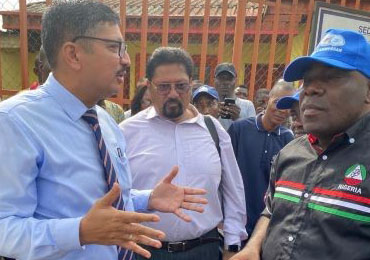
Despite the Federal Government’s promise to end casualisation of workers, there is a surge in its adoption even as other forms of indecent employment practices gain traction, GLORIA NWAFOR reports.
The unending casualisation of workers is becoming a major concern to stakeholders.
Although, where there is an acute shortage of jobs for those seeking them, the temptation to exploit the system is high.
Coupled with the lack of adequate laws to protect the vulnerable casualised workers by the government, the lot of protecting those entangled in the mix naturally falls on the labour unions.
While the labour unions lack political powers and authority to stamp out casualisation, they often rely on various conventions and regulations of international organisations such as the International Labour Organisation (ILO) to carry out picketing of premises of firms that engage in the practice.
For instance, members of the Chemical and Non-Metallic Products Senior Staff Association of Nigeria (CANMPSSAN) last week, protested at the premises of the Shongai Packaging Industry Limited situated at KM 38, Lagos-Abeokuta Road, Sango Ota, Ogun State, over inhuman treatment and casualisation of its members.
The protest, spearheaded by CANMPSSAN and allied unions was led by the President of CANMPSSAN, Segun David, and they temporarily paralysed activities at the company’s office.
The union accused the company of dehumanising the workers and casualisation by the management.
Among others, the union raised concerns of equipment safety concerns, poor medical provision and compensation for injured staff.
The protesting workers, who gathered at the entrance of the company as early as 7:00 am, brandished placards and sang solidarity songs, accusing the management of various anti-labour practices.
While addressing the protesting workers, CANMPSSAN President, David, frowned at the company’s lackadaisical approach to addressing the workers’ concerns, which he noted have lingered for long.
He said the picketing of the company would continue if the organisation refused to take necessary action.
He said that the union responded to complaints by their members working in the company over precarious working conditions on-site.
According to David, the management engaged the workers on an ad-hoc basis with no conditions of service attached nor any welfare or medical services in place.
He said: “In October 2022, the services of some workers were terminated for no just reason of which they were not informed before the termination.
“The union reached out to Shongai’s management, urging them to fulfill their obligation by compensating the terminated workers with their rightful benefits. Despite their initial agreement, the company failed to follow through, instead proposing that the workers return as contract employees. This shift suggests a deliberate attempt by the company to casualise its workforce.”
He said that despite numerous meetings, arbitration sessions and intervention by the Ministry of Labour, Shongai continually failed to honour its commitments.
According to him, even after setting deadlines, such as January 2023, they repeatedly reneged on their promises.
David further explained that efforts to resolve the matter persisted through mid-2023, with the company consistently failing to meet its obligations.
“When pressed further, they suddenly introduced a new gratuity calculation method without consulting the union, a move deemed unacceptable. Now we are in mid-March and the gratuity of these workers is yet to be paid and the welfare of other workers in the company, which is also part of our agitation today, has not improved,” he said.
He pointed out the cases of two of their members whose appointments were terminated in October 2022 without any compensation.
According to him, “Our members were terminated in October 2022 with our paying them their benefits, instead, their appointments were converted to contract staff. This has been going on for so long and nothing was done.”
While the management of Shogai, through the head of the HR Department, Funmilola Oladipupo, called for a meeting to address the situation, it agreed that the two retired staff would be paid gratuity in terms of expiry time based on their current salary.
It agreed that the welfare facilities would be improved; the yearly performance appraisal exercise would be concluded and implemented; there would be regularisation of casual workers, and accident victims in the organisation would be adequately compensated, among others.
David, had before now appealed to the federal government to gear its policies towards stopping casualisation and contract staffing employment in the country, or at least curtail it.
He described casual work as often temporary, with uncertain wages, long hours, and no job security, noting that the matter should be pursued vigorously by the government.
He added that it could be actualised through collaboration with organised labour and civil society organisations.
He said: “The rise of casual employment is now a global trend in the larger global picture where decent work as a path to broad-based development is rejected and more jobs are created through outsourcing or labour agencies.
“Casual work is often temporary, with uncertain wages, long hours, and no job security .
“The growth in irregular work has changed the nature of employment from a labour relationship to a commercial relationship, with the worker taking all the risks. The truth is that the owner of the business wants to cut costs by all means possible so that human capital can be treated as mere robots.
“Our position as a trade union organisation is that government policies must be geared towards stopping casualties or at least curtailing them. This should be pursued vigorously and actualised through collaboration with organised labour and civil society organisations.”
Before now also, President of the Nigeria Labour Congress (NLC), Joe Ajaero, had lamented unfair employment practices, among others at workplaces, indicting the Ministry of Labour and Employment for the upsurge in casualisation and outsourcing of workers, among other forms of indecent employment practices.
He said: “The issue of job protection is sad because there are even no jobs. So, what are we protecting? Countries like ours have to capture the number of people that are within the unemployment brackets and underemployment brackets. A lot of people in Nigeria are underemployed.
“In the absence of social security or social safety, you have a lot of people who are unemployed and you are talking about job protection. It is a big problem that we are in .
“It is the same with the issue of casualisation and outsourcing. The ministry does not seem to have an answer to this. Rather, they are trying to get unions to sign an agreement with employers, legalising casualisation. Those that are casualised or outsourced should and must belong to a union. How long will they remain as casual or outsourced workers?
“To worsen the matter, within a period, probably after every two years or even one year, they disengage these casuals and bring in another set of casuals. It is something that we will have to look at as a national policy and ensure that somebody cannot be outsourced forever. So, we need a new direction towards it.”
Indeed, casualisation cuts across virtually all sectors of the economy.
A report published by the Campaign for Democratic Workers’ Rights, showed that over 45 per cent of the workforce in Nigeria operates as casual workers, while 50 per cent of the burden of casualisation exists in the downstream oil and gas sub-sectors of the economy, telecommunication, banking, construction, mining and some other workplaces.
According to experts, development is assuming a worrisome dimension because of the saturated labour market and a quest to maximise profits by multinationals and other corporate entities.
The NLC boss, who noted that the challenge has become a general problem across the country, pledged to confront it headlong.
He noted that the challenges are based on policies of the government, which tend to deprive workers of their income.
In his submission, the Director-General of the Nigeria Employers’ Consultative Association (NECA), Adewale-Smatt Oyerinde, said while outsourcing is accepted globally, casualisation should be disallowed entirely.
He said the employers’ body was in support of a decent work environment and standardisation of employment across sectors.
“Outsourcing is globally accepted, while casualisation is frowned at. That the private sector is facing enormous challenges, which sometimes necessitate some companies going the route of outsourcing and casualisation might be correct, because of the socioeconomic situation that businesses are forced to endure.
The harsh regulatory environment and dwindling income, all contribute to making doing business in Nigeria very uninteresting,” he said.
He said NECA has reached out to unions to deepen collaboration and advocate a favourable environment that will enable businesses to thrive, as well as enable employers and employees to contribute to national development.
He said the Ministry of Labour in partnership with the social partners has done much to regulate employment in most sectors.
Recently, he said NECA and the ministry reviewed employment guidelines in the oil and gas industry. “It will progressively eradicate the issue of casualisation and contract staffing to ensure standardisation of employment in all industries. The ongoing effort is also to ensure standardisation of employment and decent work across the board,” he said.
President of the Trade Union Congress of Nigeria (TUC), Festus Osifo, also pledged to curb casualisation in the oil and gas industry.
Osifo, who is also the president of the Petroleum and Natural Gas Senior Staff Association of Nigeria (PENGASSAN), described casualisation as modern slavery.
Stating that casualisation has become a menace in the sector, he said: “This is a message of hope for workers that have not been enjoying the joy of working. The first step to address casualisation in the industry is unionising the workers to give them a sense of belonging, which is by the International Labour Organisation (ILO).”













